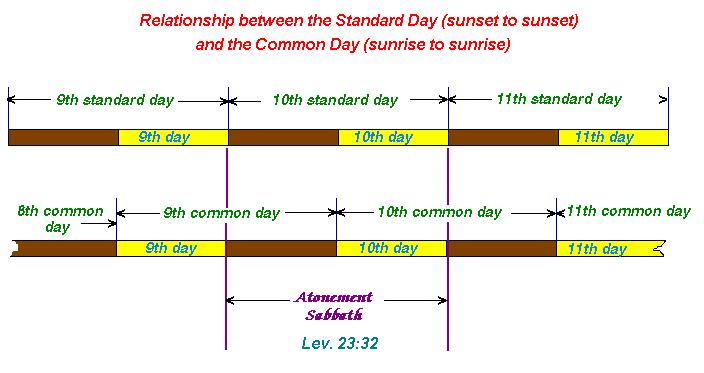|
|
|
|

Here is a comparison of the common day, and the standard day. In both formats the daylight part of the day is the same, but the night associated with each is different. We take the night before with the standard day, and the night after with the common day. Common days begin at sunrise, and standard days begin at sunset. Hence if we say the day of atonement begins in the ninth day and at the start of the 10th day, then this is in the overlapping part of the two systems, i.e. in the night part of the ninth common day, which is the same as the night part of the tenth standard day, which up to midnight is called 'evening' (see Evenings Chart).
The use of a sunrise
reckoning in Temple rituals implied in Josephus' statements is supported
by some Talmudic passages. Jacob Z. Lauterbach explains that "the
older system [sunrise to sunrise] continued all through the time of the
existence of the second Temple, and there the day was reckoned from morning
to morning, or as the Talmud puts it 'in sacrificial matters the night
follows rather than precedes the day.'"32
The latter statement from the Talmud "simply means," writes Lauterbach,
"that in the sanctuary the conservative priests persistently held on to
the older practice [sunrise reckoning] though in all other spheres of life
it had been abolished or changed."33
Lauterbach continues pointing out that "according
to the Talmud (p. Ned. 8:1 [40d]) even among the common people the older
system continued and in the popular language the day included the following
and not the preceding night."34 (Samuele Bacchiocchi,
The Time of the Crucifixion and the Resurrection; Biblical Perspectives,
copyright 1985).
The most powerful evidence that the sons of Israel reckoned the day according to the common day comes from the Exodus narrative, particularly the account of the quail (see chart) Now the they entered the wilderness of Zin on the 15th day of the second month (Exodus 16:1) which just about everyone has assumed to be a Sabbath since everyone assumes that manna started falling on the first day of the week; We can establish on the basis of Astronomy alone that this day was the Sabbath, without assuming that Yahweh chose the first day of the week to send manna. In fact the manna started coming on the second day. Now the narrative says that they arrived in the wilderness of Zin on the 15th day of the month. If they arrived on that day, then it means that they traveled on that day, but as we noted the 15th standard day was a Sabbath, so evidently they traveled in the night following the 15th standard day, which was the 15th common day, and they arrived in Zin before the end of the 15th common day, that is before sunrise.
Other evidence for the common day includes Exodus 12:18, which commands the eating of unleavened bread "on the fourteenth day of the month at even" which is evidently the second evening of the 14th day reckoned according to the common day, which is equal to the beginning of the 15th standard day.
All Rights Reserved.
Send us email.
www.parsimony.org